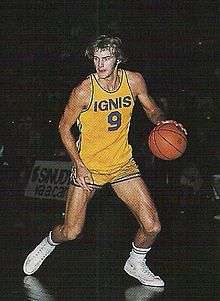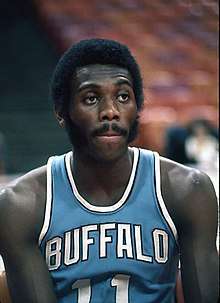FIBA Intercontinental Cup
The FIBA Intercontinental Cup, also commonly referred to as the FIBA World Cup for Champion Clubs, or the FIBA Club World Cup, is a professional basketball competition that is endorsed by FIBA World and the NBA. Historically, its purpose has been to gather the premier basketball clubs from each of the world's geographical zones, and to officially decide the best basketball club of the world, which is officially crowned as the world club champion. The World Cup for Clubs has been contended mainly by the champions of the continents and/or world geographical regions that are of the highest basketball levels.
 | |
| Organising body | FIBA |
|---|---|
| Founded | 1965 |
| First season | 1965 |
| Country | FIBA member countries |
| Confederation | FIBA Americas and FIBA Europe |
| Number of teams | 4 |
| Current champions | (2020) |
| Most championships | |
| Website | intercontinentalcup |
The league champions of the NBA, which is considered the most prestigious club competition from the North American zone, currently decline participation. The NBA currently opts instead to send the champions from the NBA G League, which is its secondary club competition. While the league champions of the EuroLeague, which is considered Europe's most prestigious club competition, are not currently permitted to participate at the competition, due to the league's dispute with FIBA. In place of the EuroLeague champions, FIBA Europe instead sends the champions of their main club competition, the Basketball Champions League (BCL).
FIBA has in the past announced plans to expand the tournament to possibly include the champion teams from the FIBA Africa League, the FIBA Asia Champions Cup, the Australian NBL, and possibly the NBA, at some point in the future.[1][2]
Format
From the 2013 edition of the tournament through to the 2015 edition of the tournament, the competition was played in either an aggregate score two-legged series, or in a single-game final format between two teams, that determined the official world club champions. Those two teams were the champions of Europe's most prestigious competition, the EuroLeague, and the champions of Latin America's premiere competition, the FIBA Americas League.
For the 2016 edition and 2017 edition, the champions of the FIBA Americas League played against the champions of FIBA Europe's main club competition, FIBA Europe Cup (2016) and FIBA Europe's current top competition, the Basketball Champions League (2017), as EuroLeague clubs were no longer allowed to participate by FIBA due to FIBA's dispute with Euroleague Basketball.[3][4]
For the 2019 edition of the tournament, FIBA expanded the competition to include the NBA G League's champions and a tournament host club. Thus, the tournament format was also changed to a final four format involving four teams.[5]
History
The FIBA Intercontinental Cup competition was originally organized between the years 1966 and 1987. The tournament had its origins with a friendly test game in São Paulo, Brazil, in 1965. The test game was contested by the winners of the South American Championship of Champions Clubs, the Brazilian club S.C. Corinthians Paulista, and the FIBA European Champions Cup (EuroLeague) champions, the Spanish club Real Madrid. S.C. Corinthians Paulista won the test game, by a score of 118 to 109. After the success of the test tournament, the first official tournament took place in the year 1966.[6]
In 1973, the competition adopted the name FIBA Intercontinental Cup William Jones, to honour the secretary general of FIBA, William Jones. FIBA tried to rebirth the competition in 1996, by reorganizing the Intercontinental Cup into a best-of-three playoff tournament between the winners of the EuroLeague and the winners of the FIBA South American League (the champions of all of South America). After that tournament, however, the competition was not held until the 2013 competition.
In August 2013, an agreement reached between Euroleague Basketball Company, FIBA Americas, and FIBA World, allowed for the World Cup for Champion Clubs to be relaunched, and to be played between the EuroLeague champion and the FIBA Americas League champion.[7][8]
In 2016, the tournament changed format, with the EuroLeague champions no longer being allowed to compete at the tournament by FIBA, due to the EuroLeague's dispute with FIBA. In place of the EuroLeague champions, FIBA Europe began to send the champions of their top club competition, originally the FIBA Europe Cup, and later the FIBA Champions League, instead.[9][10] For the 2019 tournament, FIBA increased the competition's number of teams to four, by adding the NBA G League's champions, and also a tournament host club. The tournament was also reconfigured into a final four format.[11]
FIBA has also considered plans to expand the tournament at some point in the future, with plans to add the champion teams from the FIBA AfroLeague, the FIBA Asia Champions Cup, the Australian NBL, and possibly the NBA.[12][13]
Names of the competition

- FIBA Intercontinental Cup (or FIBA World Cup for Champion Clubs): (1966–1980)
- FIBA Club World Cup: (1981)
- FIBA Intercontinental Cup (or FIBA World Cup for Champion Clubs): (1982–1984)
- FIBA Club World Cup: (1985–1987)
- FIBA Intercontinental Cup (or FIBA World Cup for Champion Clubs): (1996, 2013–present)
- Since 1973, the tournament has also been named in Honor of Renato William Jones, so the tournament's full official names would be either FIBA Intercontinental Cup "William Jones", or FIBA Club World Cup "William Jones".
- The tournament is also referred to as the FIBA Intercontinental Cup of Clubs, in order to avoid confusion with the 1972 FIBA Intercontinental Cup of National Teams.
1965 test tournament

The FIBA Intercontinental Cup unofficially began with the friendly competition of the 1965 FIBA Intercontinental Cup Test in São Paulo, Brazil, in 1965. The game was played by the defending champions of the South American Club Championship, S.C. Corinthians Paulista, and the defending champions of the FIBA European Champions Cup (EuroLeague), Real Madrid. It was held at the Ginásio Poliesportivo Parque São Jorge. Corinthians won the game 118 to 109, with Wlamir Marques of S.C. Corinthians scoring 40 points in the game.[14] Due to the test tournament's great success (attendance for the game was 10,000[15]), the FIBA Intercontinental Cup was made an official annual tournament by FIBA. The first official FIBA Intercontinental Cup tournament was then held the following year.[16]
1972 special version
In 1972, FIBA held a 4 team tournament, featuring the Soviet Union national basketball team, the Polish national basketball team, the Brazilian national basketball team, and the NABL All-Stars Team, which participated in the place of Team USA. Although this tournament is not a part of the actual Club World Cup, it is still listed in the event's history as a special version of the tournament and counts as one of the editions, while the actual club competition was on hiatus between the years of 1970 and 1973.[17]
Results
* Unofficial – the 1965 edition of the tournament was a test edition.
* National teams – the 1972 edition of the tournament was contested by national teams rather than professional clubs.
Statistics
Titles by club
| Rank | Club | Titles | Winning years | Runners-up | Finalist years |
|---|---|---|---|---|---|
| 1 | 5 | 1976, 1977, 1978, 1981, 2015 | 2 | 1968, 70 | |
| 2 | 3 | 1966, 1970, 1973 | 4 | 1967, 74, 76, 77 | |
| 3 | 3 | 1967, 1968, 1969 | – | – | |
| 4 | 2 | 1975, 1982 | 1 | 1983 | |
| 5 | 2 | 2017, 2020 | – | ||
| 6 | 1 | 1979 | 2 | 1973, 81 | |
| 1 | 1983 | 2 | 1978, 84 | ||
| 8 | 1 | 1980 | 1 | 2014 | |
| 1 | 1985 | 1 | 1987 | ||
| 1 | 2014 | 1 | 2019 | ||
| 1 | 2016 | 1 | 2017 | ||
| 1 | 1974 | – | |||
| 1 | 1984 | – | |||
| 1 | 1986 | – | |||
| 1 | 1987 | – | |||
| 1 | 1996 | – | |||
| 1 | 2013 | – | |||
| 1 | 2019 | – | |||
| 19 | – | 2 | 1975, 80 | ||
| 20 | – | 1 | 1966 | ||
| – | 1 | 1969 | |||
| – | 1 | 1979 | |||
| – | 1 | 1982 | |||
| – | 1 | 1985 | |||
| – | 1 | 1986 | |||
| – | 1 | 1996 | |||
| – | 1 | 2013 | |||
| – | 1 | 2015 | |||
| – | 1 | 2016 | |||
| – | 1 | 2020 | |||
| Total | 28 | 28 | |||
- The 1965 test tournament and the 1972 tournament for national teams are not included.
Performance by national league (country)
| Rank | Country | National League | Titles | Runners-up |
|---|---|---|---|---|
| 1 | Primera División / ACB | 8 | 3 | |
| 2 | LBA | 7 | 6 | |
| 3 | NABL – 3 | 4 | – | |
| NCAA Division I – 1 | – | |||
| 4 | GBL | 3 | – | |
| 5 | CBB / NBB | 2 | 9 | |
| 6 | CAC / LNB | 1 | 4 | |
| 7 | BSL | 1 | 1 | |
| Premier League | 1 | 1 | ||
| LPB | 1 | 1 | ||
| 10 | CSBL | – | 1 | |
| BBL | – | 1 | ||
| DBL | – | 1 | ||
| FFL | – | 1 | ||
| Total | 28 | 28 | ||
- The 1965 test tournament and the 1972 tournament for national teams are not included.
MVP awards
Finals top scorers


- Player nationality shown by national team.[18][19]
* Unofficial – the 1965 edition of the tournament was a test edition.
* National teams – the 1972 edition of the tournament was contested by national teams, rather than clubs.
Broadcasters
All four games are streamed through FIBA's YouTube channel for free in USA and the unsold markets with highlights available in all territories.[82] The tournament is also streamed for free through both FIBA's Facebook and NBA G League's Twitch channel, as well as the FIBA-DAZN's subscription streaming service Livebasketball.TV.
| Country/region | Broadcaster |
|---|---|
| TNT Sports | |
| Arena Sport | |
| DAZN | |
| Cosmote Sport |
References
- Esportes.Opovobr Com Copa Intercontinental, Fiba ensaia Campeonato Mundial. Archived 2019-01-17 at the Wayback Machine (in Portuguese)
- Estadao.com Pinheiros e Olympiacos começam a disputar o título da Intercontinental. (in Portuguese)
- Fraport Skyliners to host Guaros de Lara in FIBA Intercontinental Cup.
- Fraport to represent Europe in the Intercontinental cup.
- La FIBA Intercontinental Cup ritorna al formato Final Four (in Italian).
- Basquetepinheirense Especial Mundial: O Mundial é nosso!. (in Portuguese)
- FIBA - Intercontinental Cup of Clubs re-launched; FIBA, 5 August 2013
- Euroleague.net Intercontinental Cup of clubs re-launched.
- Fraport Skyliners to host Guaros de Lara in FIBA Intercontinental Cup.
- Fraport to represent Europe in the Intercontinental cup.
- FIBA Intercontinental Cup to reportedly go back to a Final Four format.
- Esportes.Opovobr Com Copa Intercontinental, Fiba ensaia Campeonato Mundial. Archived 2019-01-17 at the Wayback Machine (in Portuguese)
- Estadao.com Pinheiros e Olympiacos começam a disputar o título da Intercontinental. (in Portuguese)
- Elite do basquete brasileiro retorna ao Corinthians depois de 16 temporadas (in Portuguese).
- Corinthians 118 x 109 Real Madrid-ESP (1965) (in Portuguese).
- Basquetepinheirense Especial Mundial: O Mundial é nosso!. (in Portuguese)
- LinguaSport.com VI Intercontinental Cup (São Paulo 1972).
- Brazil legend Wlamir Marques helped lay foundation for FIBA Intercontinental Cup with 51-point explosion for Corinthians.
- Long, rich history of FIBA Intercontinental Cup.
- Hall of Famer Oscar shined on FIBA Intercontinental Cup stage.
- Arvydas Sabonis dominated the stage of FIBA Intercontinental Cup 33 years ago.
- Olympiacos Piraeus win the 2013 FIBA Intercontinental Cup.
- 2013 FIBA Intercontinental Cup Box Score.
- 2014 FIBA Intercontinental Cup Box Score.
- FINAL (SECOND LEG) TOP SCORER: Jeremy Pargo (28).
- 2015 FIBA Intercontinental Cup Box Score.
- FINAL (SECOND LEG) TOP SCORER: Ricardo Fischer (26).
- Venezuela campeón de la Copa Intercontinental de clubes de la FIBA (in Spanish).
- Guaros de Lara crowned 2016 FIBA Intercontinental Cup champions.
- FINAL TOP SCORER: Zach Graham (19).
- Iberostar Tenerife wins 2017 Intercontinental Cup.
- Iberostar Tenerife crowned 2017 Intercontinental Cup champions.
- 2017 FIBA Intercontinental Cup Box Score.
- FINAL TOP SCORER: Mario Little (23).
- Final Score 86 70 Rio de Janeiro (BRA).
- "FIBA Intercontinental Cup to be distributed globally". FIBA. Retrieved 2020-02-07.